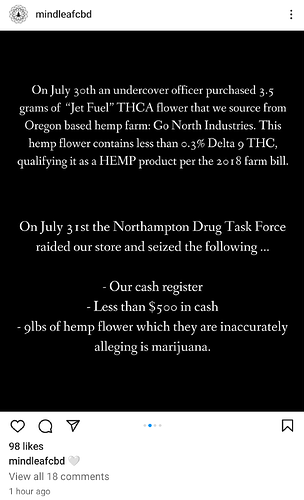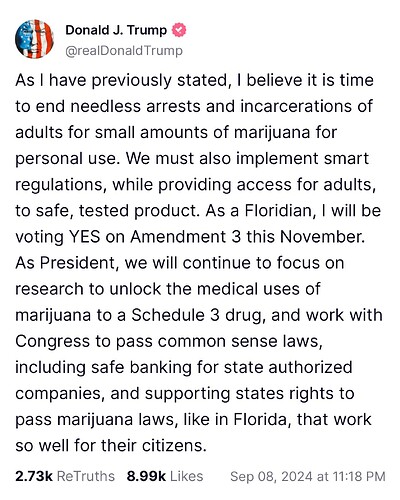https://www.timesunion.com/capitol/article/ny-s-war-licensed-hemp-stores-intensifies-19630598.php
Fuck the adblock police
https://archive.is/811N9
4th circuit opinion - very dense legalese
tonya_anderson-hempdrugtesting.pdf (3.1 MB)
4th circuit opinion - very dense legalese
tonya_anderson-hempdrugtesting.pdf (3.1 MB)
Can save everyone some time: the section we’re interested in is all Pages 27-39. The rest is rather specific regarding the ADA or an NC law about employer discrimination based on “lawful use of lawful products” (written in the 90s to protect tobacco).
The meat is where the court is trying to determine if the employee who was fired was using lawful products when they used Delta 8, HHC, THC-O,.etc vapes.
tl;dr, the court affirms that the farm bill hemp definition includes delta-8, HHC and THC-O(!) contrary to DEA opinions, due to a relatively loose understanding of the conversion process versus “synthetic chemicals in a lab”. I love to see them thumbing their nose at the DEA, but their logic seems somewhat strained**. Lady making the claims still absolutely fucked 7 ways by not making her requests for accommodations properly nor providing any proof that the gas station vapes she used didn’t simply contain illegal levels of D9.
**Quotes from the PDF (emphasis mine)
The Ninth Circuit held that it didn’t need to consider the DEA’s position on synthetically derived substances because the definition of “hemp” under the 2018 Farm Act was unambiguous in its application to all products derived from the cannabis plant, “so long as they do not cross the 0.3 percent delta-9 THC threshold.” And, in any event, the Ninth Circuit continued, the cited regulation-Implementation of the Agriculture Improvement Act of 2018 “suggest[ed] the source of the product not the method of manufacture is the dispositive factor for ascertaining whether a product is synthetic.”
And
Guidance concerning synthetic cannabinoids from other federal agencies also supports this conclusion. For example, the National Institute on Drug Abuse (“NIDA”), a division of the National Institute of Health, defines a synthetic cannabinoid as “a class of lab-made substances that are chemically similar to chemicals found in the cannabis plant, though they often produce very different effects.”
And in an explanation of the manufacturing process for products featuring synthetic cannabinoids, the NIDA noted that such products are “typically” manufactured by taking the “[i]llicitly manufactured synthetic cannabinoids” and “add[ing] [them] to liquid cartridges used in vaping devices or to dried, shredded plant material so they can be smoked.”
These definitions suggest that, rather than originating from organic matter-like the hemp-derived cannabinoids at issue, synthetic cannabinoids are just that: compounds manufactured entirely out of synthetic materials. Because the statute is subject to this other reasonable (and, we think, better,) interpretation, we reject Diamondback’s contention that the DEA’s interim final rule or letter mandates a finding that THC-O is illegal.
… so basically the DEA harped on calling the aminoalkylindoles and other Spice/K2 ingredients “synthetic cannabinoids” so much that a common sense legal interpretation excludes “semi-synthesis” from being “synthetic” based on the hemp source of the starting materials. Bet.
I’m thinking with this logic if you could get Cannabis Sativa to produce phenylacetone, you could make “hemp meth”, as long as you kept it under .3% D9. Maybe I shouldn’t give anyone ideas…
Nice to see federal courts disagree with the DEA.
Everyone here calling it a loophole is wrong.
I like to think of it as “regulatory deadlock”, at least for the THCa case. The DEA has never ceded an inch in their interpretation of total THC / all testing being post decarb. But they don’t make or interpret the laws. So we have what we do. Similarly for D8/HHC/etc, there’s no prior precedent of something exempting a category of compounds from the purview of the Analogue Act due to their source, but that’s exactly what the currently active Farm Bill does. So we see this thrashing about (back and forth in the courts, different people toeing different lines, uncertainty over THC-O, THC-C8, etc), but technically it’s just the law, not a loophole in the law.
Is that a reasonable interpretation?
I still think d9 as an intermediate is problematic legally. There’s no precedent that has allowed for synthesis/concentration of d9 above .3% as WIP yet
D9 as an intermediate hasn’t been court tested right? I’ve also seen people express the logic of “HD9” aka literal Delta-9-THC is “hemp” because it was converted from CBD from plants that passed <.3% testing. And I’d imagine that would fall somewhat quickly by court interpretation (as well as the “D9 as an intermediate defense”, if there was a hint of evidence you might have sent/advertised non-compliant products), but I didn’t expect the DEA’s THC-O ruling to be opposed either.
Just c.y. wholesale vs Holcombe, but it was dismissed for lack of standing iirc
I’m misremembering, that’s smokeable flower. There was one a few years ago I’ll have to look up when I’m home
Edit: HIA/RE Botanicals tried it
Dude I’m so fucking sick of how salty Delta 9 growers are about their industry suffering from competition from hemp farms and I’m about to make a big post about it. I had an old user and here but I think it was deleted from inactivity. I’m just so goddamn sick of being accused of being a shill whenever say anything about D8 that isn’t just calling it poison.
I wonder what will happen to the States which operate Federally illegal Marijuana industries that also outlawed Federally legal Hemp industry products in order to create a monopoly the sale of psychoactive cannabinoids and make more money.
You can’t possibly believe trump wrote, dictated, or even read that post. We all know you’re too smart for that. Playing dumb isn’t cute.
This was posted shortly after meeting 1 on 1 with the CEO of Trulieve - I don’t really care whether or not he wrote it himself.
Why would you think this? Donald Trump is an amazing President. He works very hard, is passionate about serving his country, and doesn’t cut corners.

